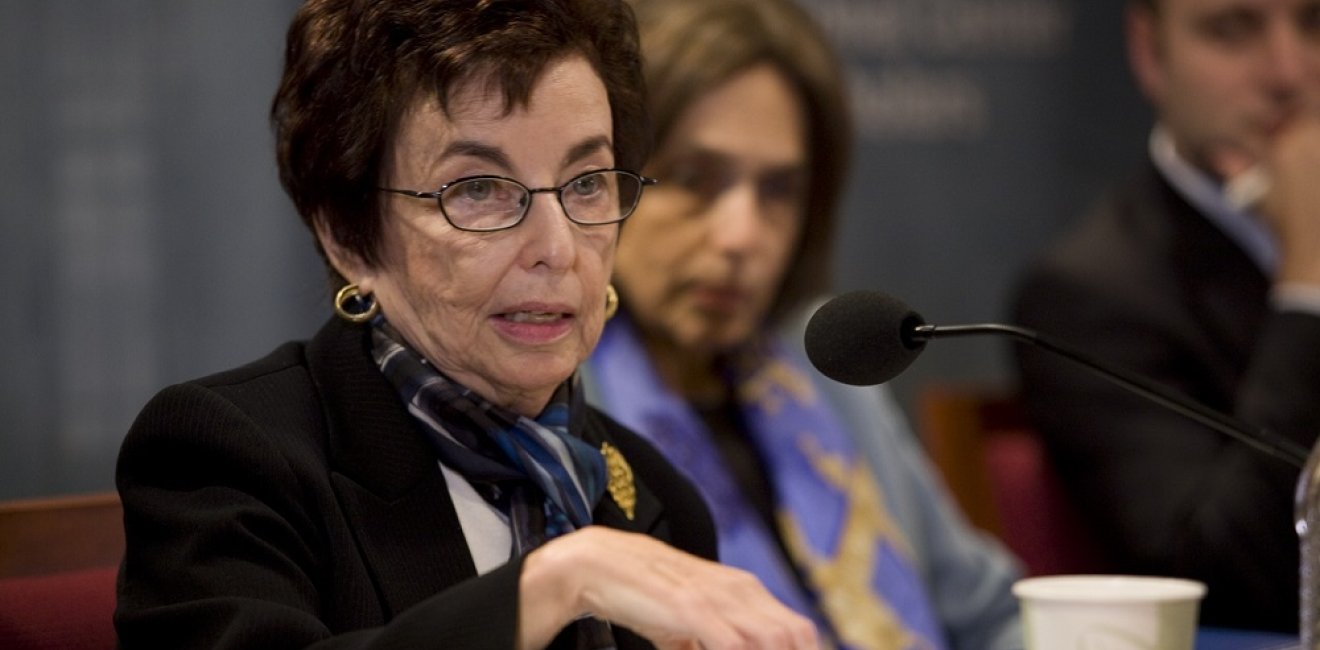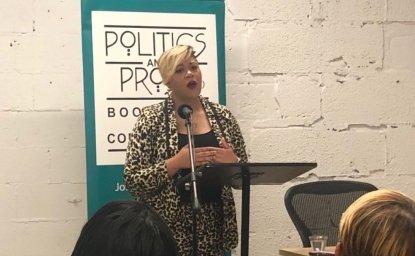
A blog of the Wilson Center

As a child, Dr. Philippa Strum aspired to become “the world’s greatest cellist” before shifting her interests to political science, especially constitutional law and civil liberties. Since the 1970s, Strum’s career flourished alongside peers like Supreme Court Justice Ruth Bader Ginsburg. Strum’s work led her to the Wilson Center for research, and as the first female director of a Wilson Center Program, then titled the Division of United States Studies. Her expertise spans Mexican-American rights, women’s rights in the Middle East, Ruth Bader Ginsburg’s legacy, and pivotal cases like Mendez v. Westminster. Strum champions open-mindedness and applies a human-focused approach to documenting social change. Viewing individuals as the fundamental drivers of movements, her life’s work reveals the anatomy of a tidal wave through its ripples. Through learning and educating on civil liberties, she, too, makes waves.
Strum grew up in Brooklyn, New York, and recalls being inspired by her parents. Her mom “created a Parent Teachers Association, made herself the president of it, and started one-woman sit-ins in the office of the local superintendent” to advocate for more funding for Strum’s elementary school. She also prevented a discriminatory “tracking” program which Strum would recognize 30 years later when proposed for her own daughter’s elementary school. “Mom,” Strum asked, “When do we stop fighting?” Calmly, her mother responded, “we win battles; we never win the war. You have to go on fighting.” A lesson that stuck with Strum throughout her career.
She received her BA from Brandeis University, a master’s degree in education from Harvard, and a PhD from the Graduate Faculty of The New School. Striving to establish herself in the male-dominated professions of constitutional law, she first wrote about major American institutions such as the Supreme Court before diving into the subject of civil liberties. “I was, in a sense, living civil liberties while I was working in civil liberties,” she reflects.
In 1979, Strum was a guest professor at Barnard College, finishing her biography of Justice Brandeis when she was faced with the opportunity to join the ACLU National Board. She introduced herself to Ruth Bader Ginsburg for advice while Ginsburg taught at Columbia Law School, was on the ACLU Board of Directors, and ran the Women’s Rights Project. Ginsburg effectively advised Strum that, “if you cared about the full range of civil liberties, the ACLU was the only game in town.” Thus, Strum ran for the board in 1979 and stayed for 35 years.
She immersed herself further in civil liberties during her State Department expert lecture tours to the Middle East. She spoke across universities in Israel and the occupied territories, and lived with a Palestinian family for three months. She then wrote her book The Women Are Marching: The Second Sex and the Palestinian Revolution, helping to articulate the active but underacknowledged feminism of Palestinian women. “I think of my work as being basically about human rights without confining it to national boundaries.”
The Wilson Center was “absolutely key” to Dr. Strum’s exploration of civil liberties within constitutional law. She first joined the Center in 1997 as a fellow, researching first amendment controversy following Neo Nazi demonstrations in Skokie, Illinois. During her Fellowship, she completed Why Americans Get to Talk so Much: Speech Jurisprudence in the United States and began studying the Virginia Military Institute case where the Supreme Court ruled it must admit women.
She later returned to the Wilson Center as the first female Program Director for the Division of United States Studies. She eventually received another fellowship to write her book On Account of Sex: Ruth Bader Ginsburg and the Making of Gender Equality, a project enriched by her bond with Justice Ginsburg. Ginsburg provided Strum access to the Supreme Court Library’s collection, reviewed her Virginia Military Institute manuscript, and permitted Strum’s Brooklyn College undergraduate students and later Strum’s Wilson Center colleagues to hear her Supreme Court oral arguments. At Strum’s invitation, Ginsburg also attended a book launch and Strum’s Wilson Center conference on women and immigration in the US.
Strum’s proposal to bring her students and colleagues to hear Ginsburg’s arguments demonstrates her commitment to making the mechanics of change accessible. She values all productive facets of changemaking and writes about the people who drive them.
From her work, Strum says, “I would hope people come away with an appreciation for the rule of law, for the role of civil liberties in the political system, and also an appreciation for the difference individuals can make.”
In Strum’s future is more scholarly writing and a memoir. “I’ve got an 11-year-old granddaughter, and I want her to know who her grandmother was.”
This blog post was researched and drafted by Bella Wexler.
Explore More in Scholar & Alumni Spotlight
Browse Scholar & Alumni Spotlight
Dr. Karina Korostelina: From Crimea to Global Peacemaking

Dr. Guadalupe Correa-Cabrera: Crossing Borders in Research and Policy



